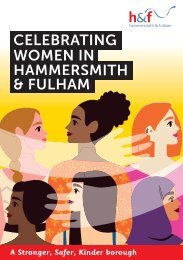Proud of our Black History
Celebrating Hammersmith & Fulham’s diversity and the historic figures who have helped make this such a special borough.
Celebrating Hammersmith & Fulham’s diversity and the historic figures who have helped make this such a special borough.
You also want an ePaper? Increase the reach of your titles
YUMPU automatically turns print PDFs into web optimized ePapers that Google loves.
BLACK HISTORY TIMELINE<br />
BEFORE 1900<br />
AD 211<br />
1241<br />
1507<br />
1546<br />
1562<br />
1596<br />
Septimius Severus, the<br />
first Roman Emperor <strong>of</strong><br />
African descent, dies in<br />
York.<br />
Earliest known drawing <strong>of</strong><br />
a black Briton is made in<br />
the Domesday book.<br />
John Blanke is a<br />
trumpeter in the c<strong>our</strong>t <strong>of</strong><br />
Henry VIII. He is the only<br />
black Tudor we know was<br />
pictured.<br />
Jacques Francis is hired<br />
to retrieve the guns from<br />
the sunken Mary Rose.<br />
He later becomes the first<br />
African to give evidence in<br />
an English c<strong>our</strong>t <strong>of</strong> law.<br />
John Hawkins is the first<br />
Englishman to lead a slave<br />
trading voyage. Around 13<br />
million Africans are forcibly<br />
taken from their homes in<br />
subsequent years.<br />
Queen Elizabeth I<br />
authorised a merchant to<br />
transport black people to<br />
Spain and Portugal, with<br />
their masters’ consent.<br />
However, most refused<br />
permission, and more than<br />
360 Africans continued to<br />
live in the British Isles.<br />
1672<br />
1688<br />
1700S<br />
1807<br />
1834<br />
1884<br />
The Royal African<br />
Company is granted a<br />
charter giving it exclusive<br />
rights to carry slaves to the<br />
Americas.<br />
Aphra Behn publishes<br />
her novel Oroonoko about<br />
African royalty. She is one<br />
<strong>of</strong> the first to attack the<br />
slave trade.<br />
By the mid-1700s sugar<br />
is grown entirely by slave<br />
lab<strong>our</strong> and is England’s<br />
biggest import. It is why<br />
some don’t want to abolish<br />
slavery.<br />
The British slave trade<br />
is abolished. However,<br />
it is still legal to own<br />
and buy slaves from<br />
slave traders across the<br />
Empire. Slave owners<br />
were compensated by the<br />
government for “loss <strong>of</strong><br />
goods” for many years to<br />
come.<br />
All slaves (except in<br />
India) are set free.<br />
However, they must work<br />
for their old masters for<br />
free or for low pay until<br />
1840.<br />
European powers<br />
meet to divide Africa<br />
between them. In many<br />
cases the new national<br />
boundaries do not take<br />
into full account the<br />
needs, history or language<br />
<strong>of</strong> the African people.<br />
These decisions<br />
<strong>of</strong>ten led to war and<br />
conflict later on.<br />
4 5


















